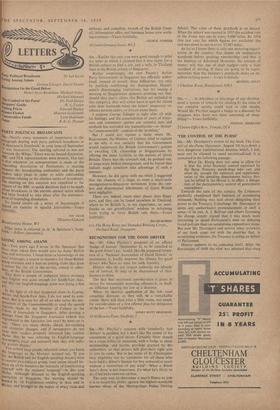LIVING AMONG ASIANS
SIR.—Two years ago I wrote in the Spectator that 1,11.1"ce steps taken then would save us many British !Ives and territories. I listed them as knowledge of the local languages, a course in manners for those British P°ing overseas and a ban on joining clubs that drew a colour bar, for all in the service, armed or other- wise, of the British Government. This drew a stream of indignant letters stressing that English was quite enough for South-East Asia, and that our English-language press was doing a fine job,
In the light of all that happened since, in Cyprus,
Africa and South-East Asia, I do not need to com- ment. But it is wise for all of us who value the per- petuation of the Commonwealth to read the speech recently made y the Minister f Cultre to te Union of Journbalists in Singaporeo. Afteru quotingh a Passage from the Singapore Journalist (which was reproduced in the Spectator last year) he went on to saY: 'There are many shocks ahead, far-reaching ,I1(1 extensive changes, and if newspapers do not '1/4,sert their readers properly informed [the context Snows that he was referring to English-language ,flewsoupers, local and national] then they will suffer tar greater shocks.'
You cannot keep people informed unless you know
the language; as the Minister pointed out, 'if you 11-e. the British and the English-speaking Asians] want to survive as a cultural group, your union should im- Press on all its members the necessity of familiarising Yourself with the national language—in this case Ilalay. Although directed to the English-speaking Journalists in Singapore, the warning should be heeded by all Englishmen residing in Asia and in Africa; and brought to the notice of every mess and
embassy and consulate, branch of the British Coun- cil, information office and business house now work- ing overseas.—Yours faithfully, 14 Great Ormond Street, WC1 * GEORGE EDINGER










































 Previous page
Previous page